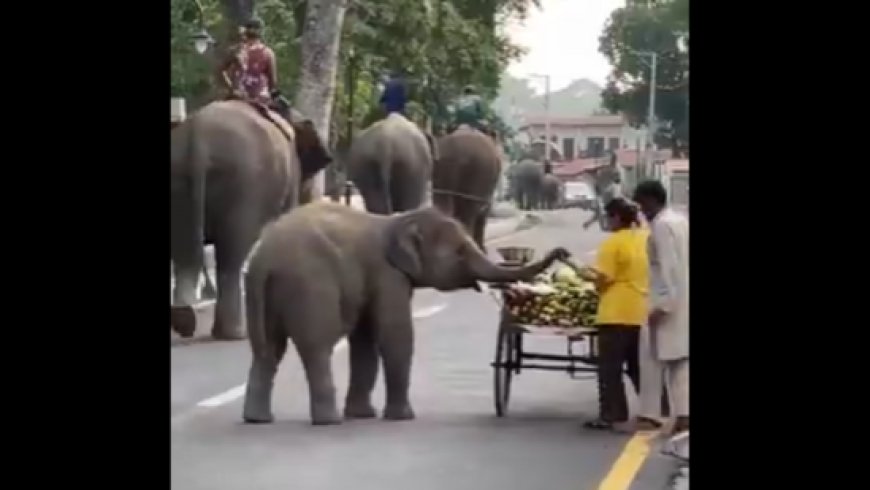Caught on Camera: Baby Elephant Casually Grabs Fruits from Roadside Cart, Melts Hearts Across India
A baby elephant was caught on video playfully snatching fruit from a roadside cart in Assam. The viral clip has sparked joy—and important conversations about wildlife conservation.

June 25, 2025 — New Delhi:
In a week filled with tense news cycles and civic debates, a brief and tender moment from rural India has captivated millions. A video of a baby elephant joyfully helping itself to a bunch of bananas from a roadside fruit cart has gone viral across social media platforms, offering a much-needed reminder of nature’s innocence and unexpected humor.
The video, reportedly filmed in Assam, shows the young elephant casually walking up to a roadside vendor, sniffing around the stacked fruits before confidently snatching a few items—much to the vendor’s surprise. Bystanders can be heard laughing and expressing amazement, while the calf continues its curious exploration of the stand before being gently ushered away by forest department officials.
The Viral Clip That’s Uplifting the Nation
The clip was first posted to X (formerly Twitter) on June 24 by the account @WildlifeMomentsIndia, and has since been reshared by wildlife lovers, environmentalists, and public figures alike. The original post, which included the caption “Proof that the cutest thieves come with trunks,” has racked up over 3.4 million views, 250,000 likes, and thousands of comments.
Watch the viral video here:
A quick snacks break for Chotu. Cute💕 pic.twitter.com/euuOjJkzN8 — Susanta Nanda IFS (Retd) (@susantananda3) June 23, 2025
Context: Elephants and Human Spaces
Incidents like these, while adorable, also reflect a deeper and increasingly common phenomenon—wild animals crossing into human habitations in search of food or due to habitat encroachment.
According to officials at the Assam Forest Department, the calf likely strayed from a nearby herd traversing a forest corridor close to a semi-urban area.
“These elephants are often part of migratory groups moving through traditional routes. With agricultural expansion and loss of green buffers, encounters like these are bound to increase,” explained Dr. Meenal Das, a wildlife biologist and field researcher in northeast India.
Despite the growing number of such interactions, this one stood out for its sheer charm. The baby elephant showed no signs of aggression or distress, and the locals present responded with remarkable calm and amusement.
Public Response: Delight and Reflection
Online reactions have been overwhelmingly positive:
-
“This is the kind of content that restores your faith in life,” wrote one user.
-
Another commented, “Let’s not forget—this isn’t just cute. It’s a silent cry for preserving elephant corridors.”
Wildlife conservation groups have also leveraged the viral moment to highlight ongoing challenges in elephant conservation. The Asian Elephant, classified as endangered by the IUCN, faces threats from habitat fragmentation, poaching, and increased contact with humans—often leading to conflict and sometimes tragedy.
Local Officials Respond
A local forest officer in Assam told reporters that the fruit cart vendor was compensated for the minor loss.
“He was more amused than upset. We explained the importance of not feeding wild animals, even unintentionally, and advised surrounding shops to keep food secure to avoid repeat incidents,” the officer said.
The elephant calf was later safely guided back toward the forest area under supervision, with no injuries or disruptions reported.
Beyond the Laughs: A Call to Coexist
Experts warn that while videos like this bring joy, they also highlight an urgent conservation narrative.
“This moment of levity shouldn’t overshadow the bigger issue: wild elephants are struggling to survive in a shrinking landscape. Human-wildlife coexistence isn’t just desirable—it’s essential,” said Arjun Mehta, founder of the NGO Corridor Watch India.
Efforts are currently underway to expand protected elephant corridors and reduce high-risk areas where herds frequently encounter urban or semi-urban zones.
Final Thoughts
This fleeting interaction between human life and wildlife serves as a reminder of India’s deep ecological connections. It’s a charming moment, yes—but also a powerful call to action.
As the baby elephant trotted off, belly full and trunk swinging, it left behind not just laughter, but a renewed sense of responsibility for how we share space with the creatures who were here long before us.














